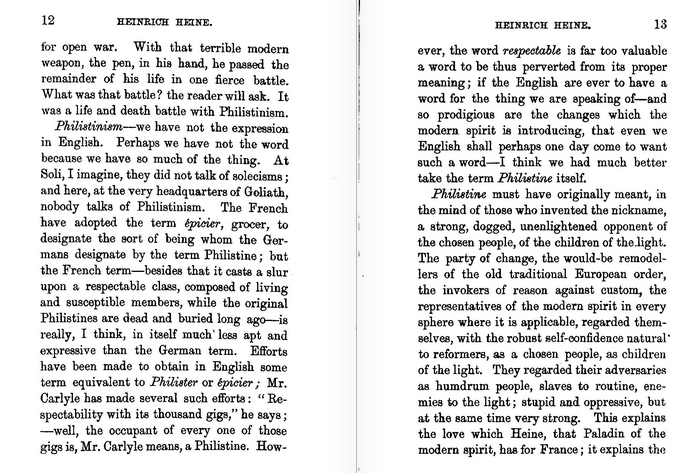Mrs. Rawthrote leaned still closer, until their faces were barely eight inches apart. She was so close she seemed to have three eyes. “Aubrey Buffing,” she said. Her eyes kept burning into his.
“Aubrey Buffing,” said Sherman lamely. It was really a question.
‘The poet,” said Mrs. Rawthrote. “He’s on the short list for the Nobel Prize. His father was the Duke of Bray.” Her tone said, “How on earth could you not know that?”
“Of course,” said Sherman, feeling that in addition to his other sins he was also a philistine. “The poet.”
It turns out that it doesn’t have much to do with the Bible. In fact, “philistine” has an amazingly-specific history: The term was unintentionally “coined” by a pastor in Germany in 1693 in reaction to a murder. It was popularized in the 1700s as German university slang, and had seeped into highbrow German by the 1800s, and some English-speakers were aware of it. It was first printed in English in 1827. It entered English in-earnest in the 1860s-1870s, via the efforts of Matthew Arnold.
Word History: It has never been good to be a Philistine. In the Bible Samson, Saul, and David helped bring the Philistines into prominence because they were such prominent opponents. Though the Philistines have long since disappeared, their name has lived on in the Hebrew Scriptures. The English name for them, Philistines, which goes back through Late Latin and Greek to Hebrew, is first found in Middle English, where Philistiens, the ancestor of our word, is recorded in a work composed before 1325. Beginning in the 17th century philistine was used as a common noun, usually in the plural, to refer to various groups considered the enemy, such as literary critics. In Germany in the same century it is said that in a memorial at Jena for a student killed in a town-gown quarrel, the minister preached a sermon from the text “Philister über dir Simson! [The Philistines be upon thee, Samson!],” the words of Delilah to Samson after she attempted to render him powerless before his Philistine enemies. From this usage it is said that German students came to use Philister, the German equivalent of Philistine, to denote nonstudents and hence uncultured or materialistic people. Both usages were picked up in English in the early 19th century. [From The American Heritage® Dictionary of the English Language, Fourth Edition copyright ©2000]
Timeline of the Evolution of the Word “Philistine”
- 1693 [Jena, Germany] : A non-student kills a university student in a quarrel.
- 1693 [Jena, Germany] : The Lutheran pastor at the university delivers a funeral oration which involves a verse from the Bible about “the Philistines” (an ethnic group). The word had no connotation at all of “uncultured” yet.
- 1690s and On [Jena, Germany]: Students adopt the word Philister (English: philistine) “to denote non-students”.
- 1700s [German-speaking Europe]: The use of the word “philistine” spreads in German university slang, as a simple shorthand for nonstudents (like “townie” in English), and probably also functions as a kind of shibboleth — this use of “philistine” is esoteric, so only students in-the-know would understand.
- 1797 [Germany]: Goethe and Schiller, Enlightenment men who valued aesthetics, use the word “philistine” (in the modern sense) for the first time in print. They use the term to derisively describe their critics, “old fashioned rationalists…who had no feeling for contemporary poetry”, a definitively modern usage. [I find this here (“Germany as Model and Monster” by Gisela Argyle, note #40), and here].
- 1827 [Britain]: Thomas Carlyle uses the word “philistine” for the first time in English, in an essay called “The State of German Literature” [here, note #40].
- 1863 [Britain]: Writer Matthew Arnold publishes a book on Heinrich Heine in which he also discusses, at length, the German use of the word “philistine”, defining it for readers. [See below]
- 1870s: [Britain] The word “philistine” starts to increase in frequency in the British-English “corpus” [Ngram]
- 1880s: [USA] The word “philistine” starts to increase in frequency in the American-English “corpus” [Ngram]
- 1987: [USA] Author Tom Wolfe uses the word “philistine” in Bonfire of the Vanities (among millions of other uses in the past 150 years).

And so it went that “philistine” (“humdrum people, slaves to routine…stupid and oppressive” in Arnold’s definition above) entered English.
One Australian novel I find published in 1892 has a character saying the following: “Puritanism crushed the artistic sense out of the English, and they are only getting it back slowly by a judicious crossing with other peoples who weren’t Puritanised into Philistinism“. Arnold reported that the word didn’t exist in English in 1863, but by the early 1890s it was being casually used like that. In the 1870s and 1880s, it must’ve been born in English.
The English word “philistine” comes from German university-student slang of the 1700s. There is no case for any other origin, since the first usage of the word in English was in an essay about German literature, and the subsequent usage by Arnold is also lifted from a discussion of German writing. How did it come into German — Apparently from a sermon delivered in 1693, after a murder. Imagine, if that nonstudent in Jena, whoever he was, had not killed that Jena student 320 years ago, we would not have the word “philistine” in English today.
A long-forgotten, unknown pastor in a town in late-17th-century Germany ended up (in effect) “coining a word” that emerged in English two centuries later. I wonder how many other words have such narrow starting points. The most wildly-successful recent word-coiner must be whoever first used “Okay” (which most authorities now believe, I’m told, comes from 1820s or 1830s New England. “Okay” is now a word in almost every language of the world.
